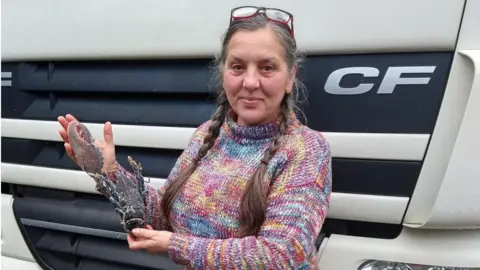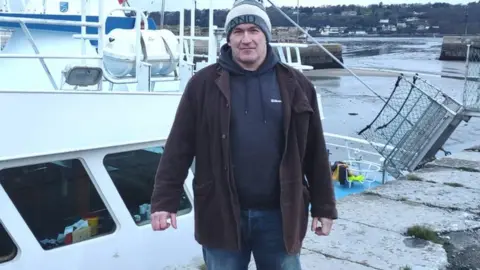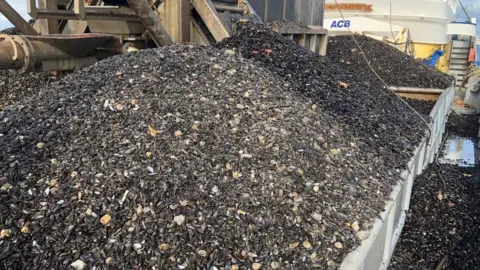Brexit: 'My £50,000 shellfish lorry was delayed for 30 hours'
 Nerys Edwards
Nerys Edwards A Welsh shellfish wholesaler says she is worried for her future after nearly £50,000 of lobsters, prawns and crabs were delayed for more than 30 hours on a lorry to Spain.
Nerys Edwards, her family and her parents before her have been sending live shellfish from Pembrokeshire to Spanish customers every week.
This month she has been experiencing how border rules - brought in as part of the UK's new relationship with the European Union - have impacted her business.
It comes as a mussel exporter in north Wales says he will stop sending goods across the Channel to the Netherlands until he sees how the new trading system works.
The UK government says it is in close contact with the industry to address any issues.
The shellfish industry in Wales is not large - but it is an important part of many communities. It is worth £13.3m, while the mussel industry injects £10.7m into the Welsh economy on top.
There were around 564 regular fishers and 287 part timers, according to a 2017 study by the trade organisation Seafish.
Their business was damaged by bad weather in the winter of 2019-20 and then by the closure of restaurants and pubs from the pandemic.
Until 1 January, when the new trading deal came into effect, 90% of Welsh shellfish was being exported to the EU - but the industry relies on being able to export to the continent as quickly as possible to keep the produce alive.
'I can't do this again'
Ms Edwards, who exports shellfish from local fishermen, had sent a lorry to the continent via Portsmouth.
She has spent two years preparing to export into the EU after Brexit and had been confident after this week's catch that she had all the documentation she needed. £48,000 was already paid to a group of 25 fishers.
But because of issues at the border the consignment was stuck in Portsmouth for 24 hours.
After boarding a ferry to Caen, it was then held by French customs for another seven. Ms Edwards said that the importer in France had made a mistake on the document that he needed to complete.
"I can't do this again next week," she told BBC Wales. "I need a break.
"But I can't leave the fishermen without incomes for long."
She added: "We're a tiny little Welsh company, its family run - we're fourth generation running it. We can't afford to take the hit."
The businesswoman said it was not only her business affected and there had been others in the queue for the ferry that had been refused.
 James Wilson
James WilsonOn the Menai Strait, James Wilson of Deepdock Ltd has stopped sending live mussels to the Netherlands until he sees how the new trading relationship between the UK and the EU works out in practice.
"We'll just have to see how much the bureaucracy costs and assess the viability of the trade going forward," he said.
The trader said only one document had to be filled in in the past.
"A colleague sent a load out last week and he had to send 41 bits of paper with his load," he said.
Every bag of mussels has to have its own documentation.
"It's not just us that are facing an additional paperwork burden its also our customers over in the Netherlands and France who also have to complete a whole different layer of bureaucracy than what they had to before," Mr Wilson said.
"The paperwork is here to stay because we are a third country and what we are facing now is the same as any country (outside the EU) has faced in the past."
 James Wilson
James WilsonAsked if he thinks businesses will go to the wall, Mr Wilson said: "I think there's a real risk that large parts of the production end of the UK seafood industry is going to change and be less populated."
Defra, the UK government department in charge of fish exports, said: "There have been reports of some fish exporters facing disruption with exports to the EU.
"The government is in close contact with the industry to understand and address any issues they are experiencing."